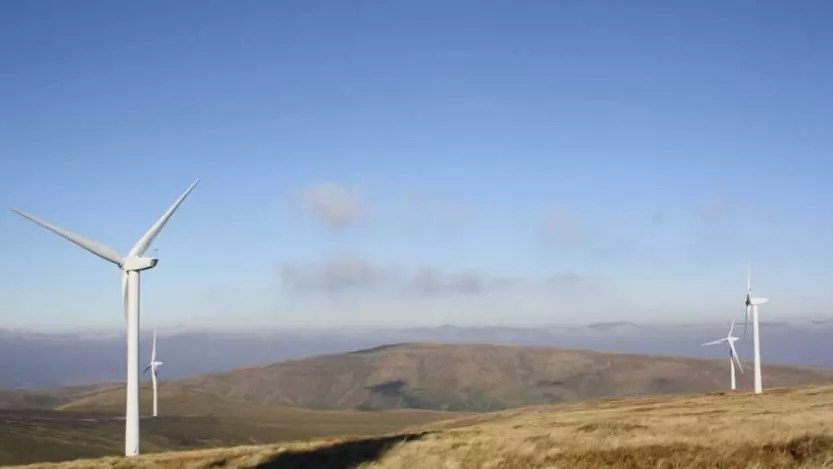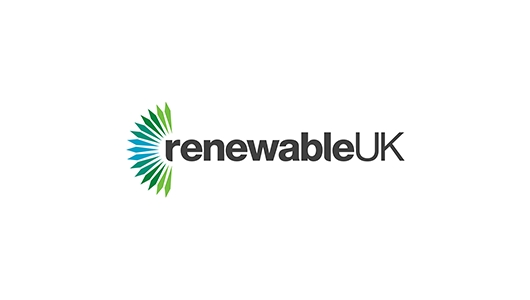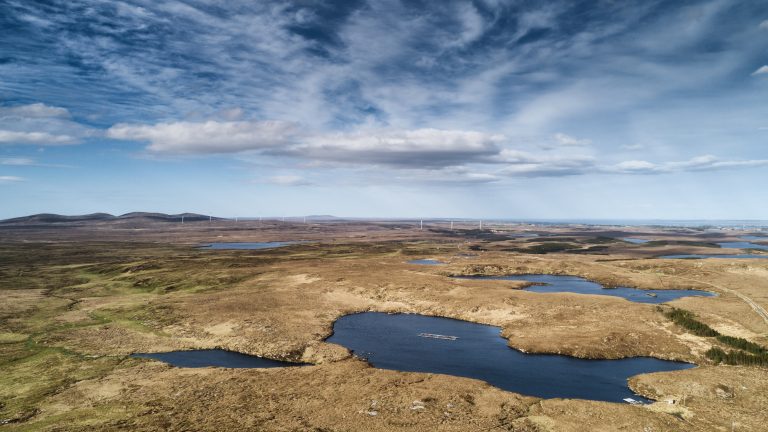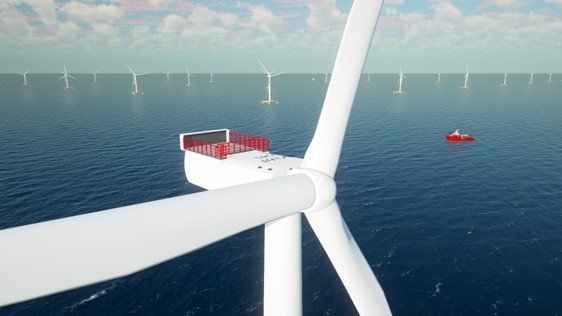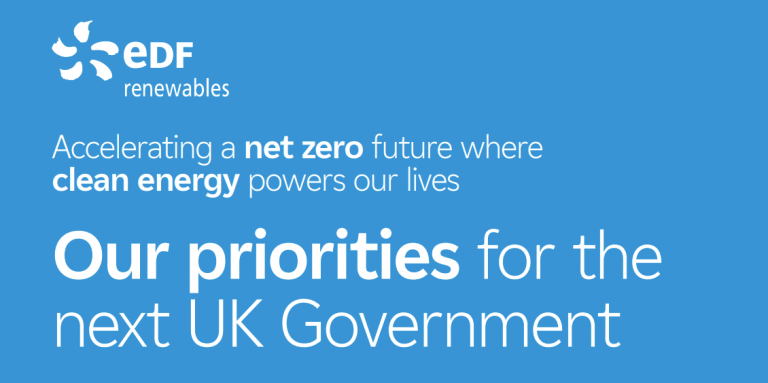
Ever wondered what it takes to get an onshore wind or solar project off the ground? As Claire Green explains in this blog, there’s a huge amount of work involved in taking a site from an idea through to an investment-worthy project – and it’s the job of her team to oversee these due diligence checks and procedures. It’s an exciting, if sometimes time-pressured job – and 100% worth it when a project makes it through to construction.
Day-to-day working life in renewables
Q. Where are you right now?
Usually I work from our office on the outskirts of Durham but during the pandemic I’ve been working from home, around 20 miles from the office.
Q. What does your role in onshore wind involve?
A. My role is to get grid-scale renewable energy projects ready for the company to make a financial investment decision (FID). I’ve just finished providing support to the solar team while a colleague has been on parental leave, so I’m now back in the onshore wind team. But whether it’s a solar or onshore wind project, the way we work is similar.
A project is usually delivered to us as a greenfield project or an acquisition. The former via our development team who will handover once a project has gained planning permission. While the latter could be a business opportunity that has already been developed to a certain stage in the project lifecycle. It would usually be my team who is responsible for acquiring a project, agreeing commercial terms and developing contractual agreements.
To enable an investment decision, a project needs planning consent, land, a grid connection, a route to market, a clear view of costs (development, capital and operational), and, most importantly, to pass certain investment criteria. A nice, windy site always helps!
Depending what stage the project is at, it’s my team’s job to put everything else in place. For instance, if there isn’t a grid connection established, we’ll develop that. The same goes for finalising land agreements or identifying how to finance a project, for example. We carry out due diligence at all stages of the project to make sure it’s feasible and ensure risks are identified and managed.
To develop the business case, I need to identify a budget, resources and timescales, which are integrated into my project management plan. I coordinate activity from around the business, including development, construction, engineering, procurement, strategy, finance and legal workstreams – so there’s involvement from lots of different teams. Communication is really important to ensure all activities are aligned and as near as possible ‘construction ready’ once a financial investment decision is made. This means everything is in place, so the company could go onto site and start building it.
Once a project starts construction, our role tends to become an advisory one. So if we’ve built up relationships with land owners, we’ll make introductions. And the same goes for links with the grid connection companies, the distribution networks and so on. We also have a responsibility for ensuring that the project is delivered in line with the business case, and any deviation is managed effectively.
Depending at what stage I pick up a project, there can be a sense of urgency to get it to a FID by a required timescale. So it can be a really exciting environment to work in, especially if you enjoy a bit of pressure.
I’ve recently been working with the Solar Technology team, completing the acquisition of one of our utility scale solar projects, and getting it to financial investment decision. It was fast-paced and great experience to learn more about the solar industry. I’m now in the process of handing this over to our construction team to build as I start to focus my attention on Stornoway Wind Farm for Lewis Wind Power – another multi-faceted project that we’ve had under our belt for a few years, but which has huge potential.
Q. What’s a typical day like for you?
A. Every day is different. There are some static weekly or monthly meetings and review boards. But generally my working day is dictated by where I am within a project lifecycle or how many projects I’m managing at any point.
I have two pre-school age children, so my days tend to start early to ensure everyone is fed, watered and dressed. Mornings are often frantic! In general, I try to start every day with a bit of a plan: I check which meetings are in the diary and if I need to prepare for anything.
Given the fast-paced project environment though, I often end up doing anything but the plan! Being involved in so many workstreams means I have contact with many people and unexpected problems can crop up, which could impact budget or timescales. It’s quite easy to steer off track in this role, but this certainly keeps things interesting, to say the least!
Developing a career in the renewables industry
Q. How did you get into renewables?
A. Academically speaking, I’m a geographer, and this is a degree that can often lead people into various industries. I studied physical geography and environmental science at university because I was really interested in the world and understanding different environments. At first, I thought about a career working on the exciting elements of geography, like volcanoes and earthquakes. But I realised that unless I was going to move, I needed to focus on something else for a career!
I always wanted to do something ‘environmental’. So I started my career in waste management and recycling at a local authority. It was in the early 2000s, when recycling was really starting to gain interest and kerbside recycling had just taken off. So it was an exciting time to be working in this area. I did some further education in water and waste engineering, but I still wasn’t sure whether I’d found my ‘niche’.
I moved into energy efficiency after a few years, and I became involved in developing strategies for various sectors, touching upon small-scale renewables. After doing that for five or six years, I decided I wanted to do something more specific in renewables – and working for a renewable energy company became my ambition.
I started a Masters in Renewable Energy, Enterprise and Management in 2010, as I thought it might offer a springboard into working on larger-scale renewables. And it did – I was offered a job at EDF, working on government energy efficiency projects. My role escalated quickly: I went from managing a couple of people to supporting a big team.
It was fast-paced and I really enjoyed the job. But again it wasn’t solely focused on renewables. Working for EDF, I’d always had my eye on EDF Renewables. So when I saw a job for a project manager at EDF Renewables, I made the transition – and the rest is history!
I’ve been here for six years now. During that time, I’ve moved to the North East – to work with the renewables team in the Durham office – and had two children. The company has grown considerably too: from about 70 when I first started to 350 people now.
Diversity and inclusion in the renewables sector
Q. Do you think the industry could do more to promote diversity and inclusion?
I’m definitely seeing more women coming through the ranks, which is a big improvement. I remember going to a conference in 2002 or 2003 – when I worked in waste management – and there were about 200 men, and I was the only female.
It did feel like you wouldn’t ever be able to compete. But, as the years have gone on, I’ve seen more women coming in – and not just on the development side of the business, but engineering too. So from a male/female diversity perspective, I think things are definitely improving.
Love what you do; do what you love
Q. What’s your favourite part of your job?
It sounds like a cliché, but I enjoy knowing that I’m doing a job that’s helping the planet, reducing carbon emissions and tackling climate change. It’s easy to forget the eventual impact on the environment when you’re knee deep in paperwork and meetings every day. But this is ultimately what motivates me to work in this industry.
I also enjoy problem solving and working with various teams to identify ways to optimise our projects to make them work economically… Which is a good thing because I have to do a lot of this every day!
Q. And what’s your least favourite part of the job?
Probably the email traffic! There’s a lot of correspondence, particularly now we’re all working more virtually. And it can prove a distraction from getting on with my other tasks.
Q. What kind of hours do you work?
A. During the pandemic, in particular, I definitely worked more hours than normal. Managing work-life balance with two young children during lockdown could be very stressful at times. But now we’re getting back to some normality, I’m trying not to make a habit of working in the evenings and regain a better balance.
The future role of renewables
Q. How do you think the Covid-19 pandemic affected your work and the industry as a whole?
A. I spent most of the first lockdown on maternity leave, watching the news and worrying about how my work would be impacted. But, in reality, aside from new working arrangements, it didn’t feel like too much had changed when I returned to work.
One thing the pandemic hasn’t impacted is our requirement for energy – there will always be a need for power, heat and light. And natural resources will always be available for the industry to continue to develop. There’s also a spotlight on renewables at the moment, so it’s a really exciting time to be working on green recovery projects.
Q. How is your role helping the UK accelerate to a net zero future?
Everyone at EDF Renewables is helping to accelerate the UK towards a net zero future. In my role specifically, I’m helping by getting projects off the ground.
I was fortunate enough to start in the company when the Renewables Obligation was in place. This provided a route to market and I was heavily involved in a few construction projects; it was exciting to see projects get started. When the ROC scheme closed it forced us to look at new routes to market and where we can make savings – whether by making projects bigger, developing new technologies, and so on.
The environment’s different now, but I’m still constantly looking to see how we can optimise projects to make them happen. And I’d like to think that through my role, I’m contributing to getting the next phase of projects into development and construction.
Q. Which areas of innovation in renewables are you most excited about?
A. I’m really interested in ‘power parks’: having wind, solar, hydrogen and battery storage, for example, within one area to create a power park. It’s some way off – due to grid and network constraints – but there’s a lot of innovation going on at the moment to see how we can balance the grid to operate all these technologies.
Hydrogen technology is another interesting area I’d like to explore. There are also developments within technologies, coming through all the time. Solar PV panels are reducing in size and becoming more efficient; turbine blades are being streamlined; even floating wind turbines and PV systems are on the horizon – anything is possible! Renewables is a hugely exciting area to be working in.
Q. What would you say to one of your children if they were interested in a career in renewables?
I would love my children to get involved in the industry. There will always be a need for energy and it’s essential we get power from renewable sources for our future generations.
I would encourage them to explore all of the different opportunities available too. I work in the project management area, but there are opportunities in engineering, legal, construction, planning and development, communications … the list goes on. It’s such a versatile industry and it can only go from strength to strength.


